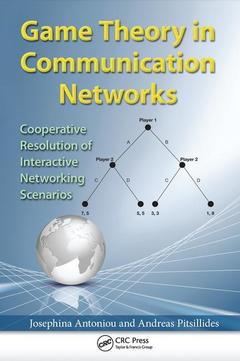Description
Game Theory in Communication Networks
Cooperative Resolution of Interactive Networking Scenarios
Authors: Antoniou Josephina, Pitsillides Andreas
Language: English
Subjects for Game Theory in Communication Networks:
Keywords
Iterated Prisoner’s Dilemma; Nash Equilibria; game theory; Grim Trigger Strategy; computer and communication networks; Nash Bargaining Solution; network modeling; User Generated Content Services; Iterated Prisoner’s Dilemma Game; Prisoner’s Dilemma Game; Prisoner’s Dilemma Type; Prisoner’s Dilemma; Nash Bargaining Game; Power Index; Nash Bargaining; Subgame Perfect Equilibrium; Coalition Formation Process; Winning Coalition; Minimal Winning Coalitions; Bayesian Game; Coordination Game; Coalitional Game; Grim Strategy; Game Theoretic Tools; Repeated Game Model; Voting Game; Bargaining Game; Wireless Access Point
85.02 €
In Print (Delivery period: 14 days).
Add to cartPublication date: 11-2016
· 15.6x23.4 cm · Paperback
172.36 €
In Print (Delivery period: 15 days).
Add to cartPublication date: 08-2012
256 p. · 15.6x23.4 cm · Hardback
Description
/li>Contents
/li>Readership
/li>Biography
/li>
A mathematical tool for scientists and researchers who work with computer and communication networks, Game Theory in Communication Networks: Cooperative Resolution of Interactive Networking Scenarios addresses the question of how to promote cooperative behavior in interactive situations between heterogeneous entities in communication networking scenarios. It explores network design and management from a theoretical perspective, using game theory and graph theory to analyze strategic situations and demonstrate profitable behaviors of the cooperative entities.
The book promotes the use of Game Theory to address important resource management and security issues found in next generation communications networks, particularly heterogeneous networks, for cases where cooperative interactive networking scenarios can be formulated. It provides solutions for representative mechanisms that need improvement by presenting a theoretical step-by-step approach. The text begins with a presentation of theory that can be used to promote cooperation for the entities in a particular interactive situation. Next, it examines two-player interaction as well as interactions between multiple players. The final chapter presents and examines a performance evaluation framework based on MATLAB®.
Each chapter begins by introducing basic theory for dealing with a particular interactive situation and illustrating how particular aspects of game theory can be used to formulate and solve interactive situations that appear in communication networks regularly. The second part of each chapter presents example scenarios that demonstrate the applicability and power of the theory?illustrating a number of cooperative interactions and discussing how they could be addressed within the theoretical framework presented in the first part of the chapter.
The book also includes simulation code that can be downloaded so you can use some or all of the proposed models to improve your own network designs. Specific topics covered include network selection, user-network interaction, network synthesis, and context-aware security provisioning.
GAMES OF TWO PLAYERS.Network Selection and User-Network Interaction. Payment-Partition Between Two Cooperating Networks. Inter-Technology Handover. Context-Aware Security Provisioning Against a Single Intruder. GAMES OF MULTIPLE PLAYERS. Network Selection and Auctions Between Multiple Networks. Network Synthesis to Support Large Traffic Demands. Admission Control for Simultaneous Service Requests. CASE STUDIES.
Josephina Antoniou received her B.A. degree (summa cum laude) in Computer Science and Mathematics from Wartburg College, Iowa, USA in May 2002. She received her M.Sc degree in Advanced Computer Technologies from the University of Cyprus in June 2004. She also received her Ph.D. at the University of Cyprus, in the area of mobile networks. She has been a Research Associate for the University of Cyprus working since June 2002, for the, IST/ICT funded projects: SEACORN, B-BONE, C-MOBILE and CCAST dealing with Enhanced UMTS. MBMS over UMTS, enhanced MBMS over converged networks and currently context-aware multicasting over converged, next generation networks. Her research interests include radio resource management and session management in mobile networks, specifically Access Network Selection algorithms in next generation mobile networks using game theoretic approaches. (http://www.NetRL.ucy.ac.cy)
Andreas Pitsillides is a Professor of Computer Science, University of Cyprus (UCY), serves as Chairman of the Cyprus Research and Academic Network (CYNET), and heads the Networks Research Lab (NetRL) at UCY. His research interests include fixed and wireless Networks (ad-hock and sensor networks, VANETS, WLANs&WMANs, UMTS Third Generation mobile networks and beyond, LTE and enhanced LTE, 4G), flow and congestion control, resource allocation and radio resource management. Also his research interests span the Internet- and Web- of Things, and Internet technologies and their application in Mobile e-Services, e.g. in Tele-Healthcare, and security issues. He has a particular interest in adapting tools from various fields of applied mathematics such as adaptive non-linear control theory, computational intelligence, and recently nature inspired techniques, to solve problems in communication networks. Andreas has published over 230 referred journal papers in flagship IEEE, Elsevier, IFAC, and Springer journals, international conferences, and book chapte




